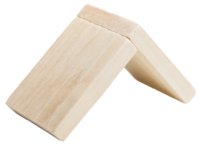How to Socialize Pet Rats
How to Socialize Pet Rats
Rats are often associated with negative feelings, but many people have found that these social and intelligent animals make great pets. Socializing a pet rat is one of the best ways to enjoy her, and you may find that she eventually enjoys being held and snuggling with you. By starting the socialization process as soon as possible and keeping your pet rat in a comfortable environment, you can socialize your rat and enjoy her company!
Minimize stress. Rats can be stressed by new environments. Minimizing stress the first few days you have the pet can make it easier to socialize them. The following can help your rats get used to their environment: preparing nesting box before the arrival, using the type of food and bedding they have been used to before slowly introducing new products and allow to settle by not handling immediately.
Start socializing as soon as possible. In order to socialize your rats most effectively, start training them as soon as they appear comfortable. Babies to older rats respond well to socialization with the proper guidance from early on in your relationship.
Avoid being discouraged if your rats are older. You can socialize them as soon as they join your family and is comfortable in their new environment. Just be aware that it might take a little more time, effort, and patience on your part. Remember that rats are intelligent and social. Proper handling and behavior from you can help ease the process.
Give a treat. One of the best ways to start to get your rats used to you is to give them treats. This can help foster their trust that you are their friend and will care for them. Open cage and gently place your hand inside with the treat in your palm. Allow your rat to sniff your hand and take the treat. If there are multiple people in your household, make sure everyone gives your rat occasional treats so he/she learns to trust them. Continue giving your rat treats until he/she takes the treat without sniffing you. This is a good sign he/she’s ready for handling. Avoid feeding her treats through the cage bars, which may teach her to snap at your fingers.
Pick up your rat. If your rat appears comfortable with you from giving treats, try picking your pet up. Be aware that rats are very active and may not want to be held or only want held when they’re sleepy. Allow your rat to come out of the cage on their own accord. Don’t invade their space by putting your hand in the cage. Place one hand under the bottom of your rat and the other under over their back to provide adequate support.
Use a small towel to pick her up if she nibbles or bites because rats are less likely to bite a towel. Avoid using gloves.
Reassure your rat during handling. Rats can scare easily, especially in the early phases of socialization. Give your rat reassurance through talking and other behaviors while you’re holding them. Talk to your rat in a soft voice throughout the handling session. Consider positive reinforcement that you repeat consistently. Pet gently while holding and talking to them.
Keep the area as quiet as possible. Avoid loud noises such as yelling and keep other pets like cats or dogs in another room. Allow your rat to burrow to help feel secure during the sessions.
Give her another treat before you put the pet back in the cage. This helps to trust you and associates handling with treats.
Keep handling sessions short. Rats may not initially enjoy being handled. Keep your initial handling sessions short to give them time to get used to. Keep sessions to about a minute to start.
Play with your rat. When your rats are hand-tamed and comfortable with you and their surroundings, it’s time to let them play outside the cage. This can keep them stimulated and physically fit. Remember that rats need a lot of stimulation because they’re social. If your rat doesn’t have a companion, they need about 4 hours of human interaction a day.
Set up a secure play area outside of your rat’s cage. You can place some toys in the area and should make sure you’re present to enjoy his/her and keep them from chewing on anything.
Be aware that out-of-cage play time is vital to the health of your rat.
Go back to handling if your rat seems scared by the playtime outside of her cage. Continue to handle them for a bit and then try reintroducing her to playtime. Give her a treat when playtime is done.
https://www.wikihow.com/Socialize-Pet-Rats




